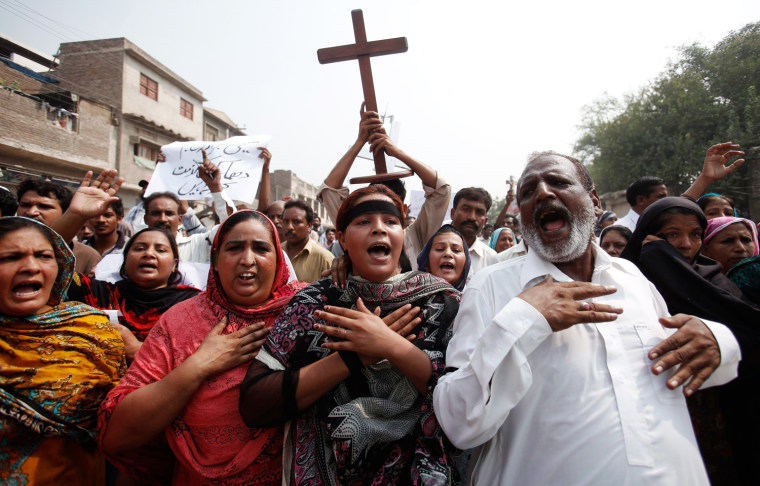
ISLAMABAD, Pakistan -- Angry Christians blocked roads on Monday in protest at Sunday’s suicide bomb attack on a church that killed 81 people in what is thought to be Pakistan's deadliest attack on members of the faith.
Carrying batons and sticks and barricading roads with burning tires, demonstrators demanded better government protection for Christians who make up about four percent of Pakistan's population of 180 million.
They brought a number of major arteries to a halt in cities including roads in the Islamic nation’s capital, Islamabad, and in Karachi where protests turned violent and police were forced to launch a baton charge.
"Terrorists have spared no mosque, church or temple in the country from attacks" on protester, Adil Kayani, 19, told NBC News, as he blocked a road in Islamabad.
"They released a leader two days ago,” he added, referring to the release of the Afghan Taliban’s former second-in-command Mullah Abdul Ghani Baradar on Saturday. “And the next day Church was attacked. Why we are targeted? What is our crime? The government must ensure protection to us."
Paul Bhatti, the head of the All Pakistan Minorities Alliance questioned his government’s policy of trying to strike a peace deal with the militants who have killed thousands of people during a decade long insurgency.
"What dialogue are we talking about? Peace with those who are killing innocent people," he told Reuters.
"They don't want dialogue,"Bhatti whose brother, a federal minister, was gunned down by an Islamic extremist in 2011, added. "They don't want peace. Our state and our intelligence agencies are so weak that anybody can kill anyone anytime. It is a shame.”
The death toll from Sunday’s attack by two suicide bombers outside the historic All Saints Church in the north western city of Peshawar rose to 81 overnight, interior minister Chaudhry Nisar Ali Khan told The Frontier Post newspaper. He added that 34 women and seven children were among the dead.
The explosion that occurred as worshippers were leaving after services to get a free meal of rice offered on the front lawn also wounded 140.
A wing of the Pakistani Taliban quickly claimed responsibility for the bombing at the 130-year-old church, saying they would continue to target non-Muslims until the U.S. stops drone attacks in the remote tribal region of Pakistan.
But on Monday the Pakistan Interior Minister Chaudry Nisar said the group which has claimed the responsibility is not based in his country.
"We will chase them where ever they are," he said in a statement to the National Assembly, the Pakistani parliament’s equivalent to the U.S. Congress.
As the country’s government announced a three-day period of national mourning for the church attack, another bomb exploded near a police patrol in southwestern Baluchistan on Monday, the Associated Press reported.
Four people, including three policemen were killed in the Pashin district around 45 miles north of the provincial capital, Quetta, police officer Abdullah Khan told the agency.
The U.S. State Department released a statement, condemning the bombing and voicing concern over worsening sectarian strife.
"The United States remains concerned about continuing sectarian violence in Pakistan that has brought heartache to Sunnis, Shia, Christians, and members of other communities across the country," the statement read. "Extremist violence against innocent Pakistani men, women, and children of any faith is an assault on universal human values."
Christians tend to keep a low profile in a country where Islamist militants frequently bomb targets they see as heretical, including Christians and Shi'ites, Reuters reported.
In 2009, 40 houses and a church were set ablaze by a mob of 1,000 Muslims in the town of Gojra in Punjab province. At least seven Christians were burnt to death. The attacks were triggered by reports of the desecration of the Koran.
Reuters and The Associated Press contributed to this report.
Related: